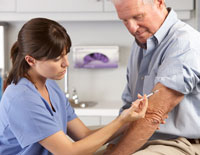
Nurse and CQC inspection adviser Elaine Biscoe says that more training is needed fornurses as their responsibilities expand at a rapid rate.
During the 20 years I have been working as a practice nurse, the boundary between the role of the nurse and GP has become increasingly blurred with nurses taking on expanded responsibilities. Like GPs, nurses in primary care work in a demanding, complex environment that no other role in their nursing careers can have prepared them for.
However, unlike for new GPs, there is very little training for this other than, at good practices, some shadowing of a more experienced colleague, and then courses or study days (when available) for specific responsibilities.
New primary care landscape
Formal consultation skills training and education about how the new and mystifying world of primary care actually works ranges from rare to unheard of. To some extent all practice nurses will have felt pressure to fulfil the expectations of everyone from the patients to their new employer. I have worked in several “training” practices and by this I mean practices that train new GPs, and the difference between the training provided for new GPs is stark and inexplicable in today’s world of primary care.
Training for practice nurses is piecemeal and varies enormously from single study days to six month diplomas. Crucially no additional training, apart from initial training to qualify as an RGN, is mandatory for much of the day-to-day work. In my experience, what is lacking is day-to-day mentoring for the nurse back in the surgery as she struggles to put theory into practice with real patients.
"What is lacking is day-to-day mentoring for the nurse back in the surgery as she struggles to put theory into practice with real patients"
This is never truer than in the areas of spirometry and diagnosis of patients with asthma and COPD, a role often left to nurses. Another example is travel health, the complexity of which, like wound care, merits a specialty in its own right.
Delegation
To add to the minefield that is now the working environment for our new practice nurse, for some areas of her work she will realise that the GP who is delegating care of the patients at the practice to her does not have appropriate knowledge either.
According to the GMC’s Good Medical Practice (2013): “When you do not provide your patients’ care yourself, for example when you are off duty, or you delegate the care of a patient to a colleague, you must be satisfied that the person providing care has the appropriate, qualifications, skills and experience to provide safe care for the patient.”
She is expected to be the expert, and crucially to always be vigilant for what she doesn’t know – often from day one. At larger practices, this is less likely as hopefully more experienced practice nurses can advise. However, let’s not forget the enormous pressure a new member of the team will feel to avoid repeatedly interrupting her colleagues and “get behind”.
Wound care
Complex wound care is another area that the new practice nurse will quickly realise occupies much of her time. At least for tasks such as cervical smears, and vaccinations, there is usually an acknowledgement that they must not be undertaken until some sort of training has been attended.
Not so for wound care, regardless of the complexity. It must be remembered that there is potential for serious complications for patients with chronic wounds. However, there is a widespread, unspoken belief that if you’re a nurse, you can deal with “dressings”.
Extended responsibilities
I acknowledge that some practices do their best to arrange an induction and training programme for their new nurses and don’t, intentionally, pressure them with responsibilities they are not ready for. However, I’m not sure there is sufficient understanding of the nature of what practice nurses do, and the training and support that is needed to ensure safe practice. Many practice nurses will be familiar with the experience of attending a training day, and then being expected to see relevant patients immediately.
"Although nurses are personally accountable for their practice, in an extended role their risk increases"
When practice nurses take on extended responsibilities, such as seeing patients with minor illness, it should be borne in mind that she will be judged by the professional standard of the post she is performing at the time; ie, if a nurse takes on a doctor’s role, she will be judged by the standards of a reasonable doctor. In other words, being a novice will be no defence. Although nurses are personally accountable for their practice, in an extended role their risk increases, so they may well have their own liability if practising autonomously.
Shared training
GPs need to take an increased interest and responsibility for the work they are effectively delegating to nurses. Most importantly they need to recognise the exposed, vulnerable nature of the role. One way of improving this understanding would be for a GP at the practice to attend some of the training days jointly with the nurses.
Practice nurse mentors
In this new world of CCGs, perhaps consideration could be given to general practice nurse mentors who could work between practices supporting new nurses as they establish themselves and become confident. There also needs to be a proper pathway into the role, as already exists with GPs.
Litigation against health professionals is increasing generally, and it is also acknowledged that there will be a need to employ new practice nurses in the next five years as current practice nurses retire. It is therefore high time there was appropriate training and support for this rewarding and challenging role.
Elaine Biscoe is a practice nurse with nearly 20 years’ experience. She has worked as a lecturer for practice nurses and acts as an expert witness for cases where there is alleged breach of duty by practice nurses. She is also a Specialist Adviser for the CQC inspections of GP surgeries.